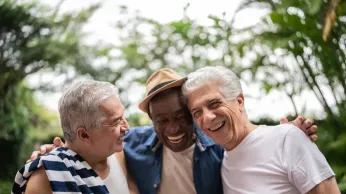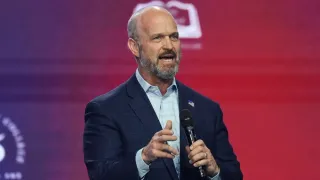
September 12, 2025
Queer Elders Are Redefining What It Means to Age Gracefully
READ TIME: 3 MIN.
For generations, queer elders have navigated a landscape marked by both social progress and persistent discrimination. Today, queer seniors are not only surviving but thriving, setting new standards for what it means to age with pride, resilience, and authenticity. As recent reporting by LGBTQ Nation highlights, these trailblazers are challenging ageist norms and societal expectations, forging communities of care, and championing policy changes that address their unique needs .
Aging in the queer community carries distinct challenges. According to SAGE, the nation’s oldest and largest organization dedicated to improving the lives of queer elders, “LGBT older people face unique challenges as we age” . Many are twice as likely to be single and live alone compared to their heterosexual peers and four times less likely to have children, leaving them more vulnerable to social isolation.
Despite these hurdles, queer elders have formed vibrant, interdependent networks. More than half (54 percent) of queer elder care recipients receive care from their partners, and a quarter rely on friends—a testament to the power of chosen family . These grassroots systems of support echo the community-building ethos that has defined LGBTQ+ activism since the Stonewall era.
Queer elders have often faced a lifetime of discrimination, social stigma, and the effects of prejudice. Research published in the National Institutes of Health’s public archives notes that “lower levels of social network size and community connectedness are of particular concern for the old–old LGBT age group,” which may lead to social isolation and adverse health outcomes if not countered with proactive engagement .
However, these same studies underscore the resilience of queer elders. Many were pioneers in the struggle for equality, participating in historic movements and enduring eras where their very existence was criminalized or pathologized. Their ability to foster positive aging experiences is often enhanced through continued social participation, advocacy, and by nurturing strong peer networks.
Queer elders must often contend with a double burden: ageism and anti-LGBTQ bias. According to Our Bodies Ourselves, older LGBTQ+ adults “often experience a mix of ageism and anti-LGBTQ sentiment, including internalized homophobia, transphobia, and ageism” . This can create barriers to accessing healthcare and social services, particularly for transgender and non-binary seniors who may face additional discrimination.
Organizations like SAGE and the National Resource Center on LGBTQ+ Aging have become vital in providing resources and advocacy. They offer training for healthcare providers, promote inclusive housing policies, and create safe spaces for older adults to connect . Such initiatives are crucial in combating mistreatment and health disparities in care settings.
The concept of “aging gracefully” takes on new meaning in the context of queer elders. It is less about conforming to societal expectations of aging and more about embracing authenticity, resilience, and ongoing advocacy. As LGBTQ Nation reports, many elders are leveraging their lived experience to mentor younger generations, participate in activism, and reshape cultural narratives about aging within the LGBTQ+ community .
Many are also celebrating milestones once thought unattainable. Federal advances in marriage equality and anti-discrimination protections have enabled more queer elders to age with dignity and visibility. Yet, challenges remain. Financial insecurity, health disparities, and gaps in social support persist, particularly for those who are transgender, people of color, or living with HIV .
Across the country, innovative programs are emerging to address these gaps. Queer senior centers, intergenerational housing, and community-based health initiatives are providing new models for inclusive aging. For instance, SAGE’s “Friendly Visitor” program pairs volunteers with isolated elders, fostering connections that reduce loneliness and improve mental health outcomes .
Policy advocacy is also central. Queer elders and their allies are pushing for expanded protections in housing, healthcare, and social security, recognizing that many still face disproportionate rates of poverty and homelessness. As the population of queer adults over 50 is projected to more than double by 2030, these efforts are more urgent than ever .






